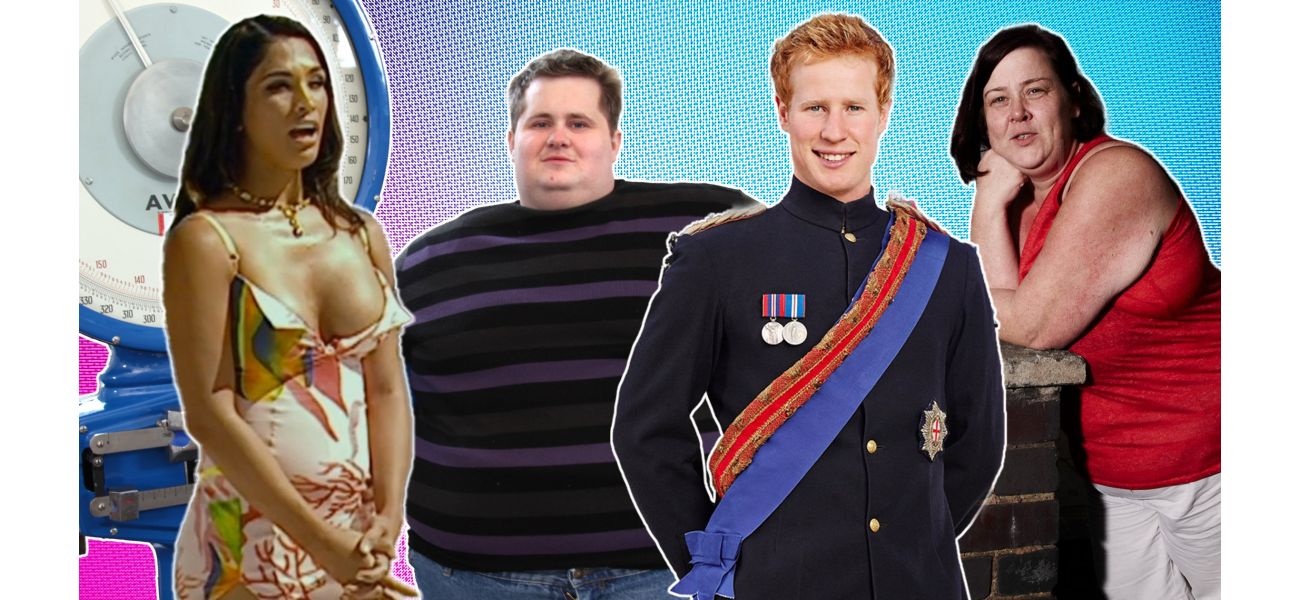Controversial reality TV shows, ranging from problematic to bizarre.
We've witnessed everything (unfortunately).
September 21st 2024.

In the past 76 years, reality TV has provided us with an endless array of concepts to keep us entertained. Some of these shows have become huge successes, like the long-running Survivor and Big Brother, which have been adapted in 63 countries worldwide. With new reality shows constantly emerging, not all of them have been met with the same level of success. While some have failed to capture their intended audience, others have pushed boundaries so much that they have raised questions about whether they should have even been created in the first place. Let's take a look back at some of these shows that would probably not be made today...
One of the most boundary-pushing shows was The British Tribe Next Door. The concept of the show was quite wild - it involved building a replica of Gogglebox star Scarlett Moffatt's home in Namibia and having her family live there for a month. Scarlett's entire family, including her mom, dad, sister, and grandmother, packed up their 20,000 belongings for this unique experience. The show sparked controversy and received criticism for its potentially offensive premise, with awkward moments like a welcome dance where the family seemed uncomfortable and Scarlett discussing her love for fake tanning with a group of Black women.
Another show that caused a stir was Fat Families, where families struggling with their weight were given help by Steve Miller, also known as the "no-nonsense fat buster". However, his approach was anything but subtle, as he threw insults at the participants, calling them things like "merry munchers" and "beach blubber bellies". The participants were put under constant surveillance and were even called out by producers if they took a break from their exercise routines. The show received criticism for its harsh and potentially damaging methods.
In the 2000s and 2010s, there were quite a few reality shows based on weight, including You Are What You Eat and Secret Eaters. One of the most extreme was Supersize vs Superskinny, where an overweight and underweight person would switch diets for five days. This meant drastically changing their eating habits, often only being given hot drinks and snacks throughout the day. While supervised by a doctor, it's unlikely that this was the healthiest approach to addressing weight issues.
There's Something About Miriam, a 2004 Sky show, followed a group of British men competing for the affection of Miriam Rivera, a Mexican model who was transgender. However, Miriam was instructed to keep her gender identity a secret until the final stage of the show, which sparked controversy and criticism. The show was seen as exploiting Miriam's identity for shock value, rather than celebrating and normalizing transgender individuals.
Another show that received backlash for its questionable methods was The Swan, which was based on the fairytale The Ugly Duckling. The show chose a group of women who were deemed unattractive and offered them extreme makeovers, including plastic surgery, to compete in a beauty pageant. This was seen as promoting the idea that physical appearance is the most important aspect of a person's worth. Similarly, 10 Years Younger also relied on extreme makeovers, this time with the goal of making participants look 10 years younger. The use of cosmetic surgery to fix internal issues was criticized, and the show received backlash for preying on people's insecurities.
In the end, it's clear that some of these reality shows from the past would not be made in today's society. While they may have been popular at the time, their questionable methods and potentially harmful messages have been called into question, and it's unlikely that they would be well-received in today's more socially conscious climate.
In the past 76 years, reality TV has become a staple in our entertainment industry, constantly providing us with new and exciting concepts. The success stories of the genre are numerous, with shows like Survivor and Big Brother reaching global popularity and being adapted in over 63 countries. However, not all reality shows have been as successful.
Some of these series would have a hard time being made today, as they pushed the boundaries of what was deemed appropriate or even ethical. Let's take a look back at some of these controversial shows and the impact they had.
One such show was The British Tribe Next Door, which involved building a replica of a celebrity's home in a remote location and having them live there for a month with their family. This caused a lot of backlash and was considered offensive and problematic, as it portrayed indigenous people as a spectacle and reduced their culture to a mere backdrop for entertainment.
Fat Families, another controversial show, featured a harsh and judgmental host who would use insulting language to shame and ridicule overweight families. The extreme methods used on the show, such as constant surveillance and restrictive diets, were criticized for promoting unhealthy and damaging attitudes towards weight and body image.
Supersize vs Superskinny, a show that asked participants to swap diets with someone on the opposite end of the weight spectrum, was also met with criticism for its potentially harmful and unhealthy approach to weight loss. The show was supervised by a doctor, but many questioned its effectiveness and the impact it could have on the participants' mental and physical health.
There's Something About Miriam, a dating show that featured a trans woman who was asked to keep her gender identity a secret until the final stage, was widely criticized for exploiting and sensationalizing her identity for entertainment purposes.
The Swan and 10 Years Younger were both makeover shows that offered participants the chance to undergo extensive plastic surgery to transform their appearance. These shows were heavily criticized for promoting unrealistic beauty standards and for exploiting people's insecurities and low self-esteem for the sake of entertainment.
In conclusion, while reality TV has provided us with many beloved and successful shows, there have also been instances where it has crossed the line and caused controversy. Looking back, it's clear that some of these shows would not be made today due to their controversial and problematic nature. As society becomes more conscious and aware of ethical issues, it's important for the entertainment industry to reflect these values and strive for responsible and respectful content.
One of the most boundary-pushing shows was The British Tribe Next Door. The concept of the show was quite wild - it involved building a replica of Gogglebox star Scarlett Moffatt's home in Namibia and having her family live there for a month. Scarlett's entire family, including her mom, dad, sister, and grandmother, packed up their 20,000 belongings for this unique experience. The show sparked controversy and received criticism for its potentially offensive premise, with awkward moments like a welcome dance where the family seemed uncomfortable and Scarlett discussing her love for fake tanning with a group of Black women.
Another show that caused a stir was Fat Families, where families struggling with their weight were given help by Steve Miller, also known as the "no-nonsense fat buster". However, his approach was anything but subtle, as he threw insults at the participants, calling them things like "merry munchers" and "beach blubber bellies". The participants were put under constant surveillance and were even called out by producers if they took a break from their exercise routines. The show received criticism for its harsh and potentially damaging methods.
In the 2000s and 2010s, there were quite a few reality shows based on weight, including You Are What You Eat and Secret Eaters. One of the most extreme was Supersize vs Superskinny, where an overweight and underweight person would switch diets for five days. This meant drastically changing their eating habits, often only being given hot drinks and snacks throughout the day. While supervised by a doctor, it's unlikely that this was the healthiest approach to addressing weight issues.
There's Something About Miriam, a 2004 Sky show, followed a group of British men competing for the affection of Miriam Rivera, a Mexican model who was transgender. However, Miriam was instructed to keep her gender identity a secret until the final stage of the show, which sparked controversy and criticism. The show was seen as exploiting Miriam's identity for shock value, rather than celebrating and normalizing transgender individuals.
Another show that received backlash for its questionable methods was The Swan, which was based on the fairytale The Ugly Duckling. The show chose a group of women who were deemed unattractive and offered them extreme makeovers, including plastic surgery, to compete in a beauty pageant. This was seen as promoting the idea that physical appearance is the most important aspect of a person's worth. Similarly, 10 Years Younger also relied on extreme makeovers, this time with the goal of making participants look 10 years younger. The use of cosmetic surgery to fix internal issues was criticized, and the show received backlash for preying on people's insecurities.
In the end, it's clear that some of these reality shows from the past would not be made in today's society. While they may have been popular at the time, their questionable methods and potentially harmful messages have been called into question, and it's unlikely that they would be well-received in today's more socially conscious climate.
In the past 76 years, reality TV has become a staple in our entertainment industry, constantly providing us with new and exciting concepts. The success stories of the genre are numerous, with shows like Survivor and Big Brother reaching global popularity and being adapted in over 63 countries. However, not all reality shows have been as successful.
Some of these series would have a hard time being made today, as they pushed the boundaries of what was deemed appropriate or even ethical. Let's take a look back at some of these controversial shows and the impact they had.
One such show was The British Tribe Next Door, which involved building a replica of a celebrity's home in a remote location and having them live there for a month with their family. This caused a lot of backlash and was considered offensive and problematic, as it portrayed indigenous people as a spectacle and reduced their culture to a mere backdrop for entertainment.
Fat Families, another controversial show, featured a harsh and judgmental host who would use insulting language to shame and ridicule overweight families. The extreme methods used on the show, such as constant surveillance and restrictive diets, were criticized for promoting unhealthy and damaging attitudes towards weight and body image.
Supersize vs Superskinny, a show that asked participants to swap diets with someone on the opposite end of the weight spectrum, was also met with criticism for its potentially harmful and unhealthy approach to weight loss. The show was supervised by a doctor, but many questioned its effectiveness and the impact it could have on the participants' mental and physical health.
There's Something About Miriam, a dating show that featured a trans woman who was asked to keep her gender identity a secret until the final stage, was widely criticized for exploiting and sensationalizing her identity for entertainment purposes.
The Swan and 10 Years Younger were both makeover shows that offered participants the chance to undergo extensive plastic surgery to transform their appearance. These shows were heavily criticized for promoting unrealistic beauty standards and for exploiting people's insecurities and low self-esteem for the sake of entertainment.
In conclusion, while reality TV has provided us with many beloved and successful shows, there have also been instances where it has crossed the line and caused controversy. Looking back, it's clear that some of these shows would not be made today due to their controversial and problematic nature. As society becomes more conscious and aware of ethical issues, it's important for the entertainment industry to reflect these values and strive for responsible and respectful content.
[This article has been trending online recently and has been generated with AI. Your feed is customized.]
[Generative AI is experimental.]
0
0
Submit Comment





